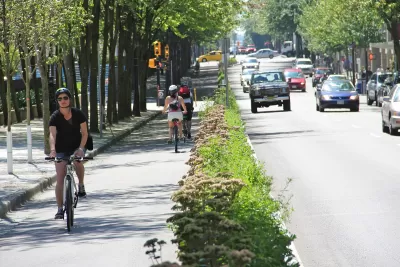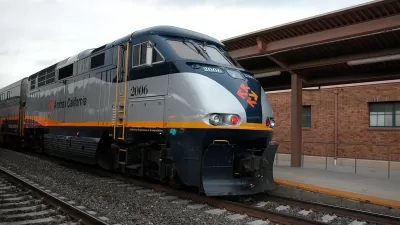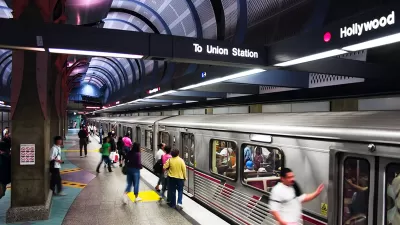Local and state agencies can apply for federal Complete Streets funding without matching funds until 2026.

In an effort to prioritize safer streets and more accessible transportation options, the Federal Transit Administration (FTA) announced it will waive a local funding match requirement for Complete Streets planning projects through 2026, reports Dan Zukowski in Smart Cities Dive. The waiver applies to projects funded by the Metropolitan Planning Program and the State Planning and Research Program.
“The waiver will support the full consideration of public transportation in the development and implementation of Complete Streets policies that require or encourage a safe, comfortable, integrated transportation network for all users, regardless of age, ability, income, ethnicity, or mode of transportation,” FTA Administrator Nuria Fernandez said in a letter shared on the FTA website.
Eligible activities include the development of Complete Streets standards, mobility and accessibility projects, connectivity plans, and policies to support transit-oriented development (TOD). This ties back to a rule written into the Bipartisan Infrastructure Law that requires states and metropolitan planning organizations to allocate 2.5 percent or more of planning funds to Complete Streets projects. In early 2022, the Federal Highway Administration (FHWA) launched an effort to make the design of federally funded roadways more aligned with the Complete Streets approach.
FULL STORY: Complete Streets local funding match requirement waived through 2026, FTA says

Planetizen Federal Action Tracker
A weekly monitor of how Trump’s orders and actions are impacting planners and planning in America.

Chicago’s Ghost Rails
Just beneath the surface of the modern city lie the remnants of its expansive early 20th-century streetcar system.

San Antonio and Austin are Fusing Into one Massive Megaregion
The region spanning the two central Texas cities is growing fast, posing challenges for local infrastructure and water supplies.

Since Zion's Shuttles Went Electric “The Smog is Gone”
Visitors to Zion National Park can enjoy the canyon via the nation’s first fully electric park shuttle system.

Trump Distributing DOT Safety Funds at 1/10 Rate of Biden
Funds for Safe Streets and other transportation safety and equity programs are being held up by administrative reviews and conflicts with the Trump administration’s priorities.

German Cities Subsidize Taxis for Women Amid Wave of Violence
Free or low-cost taxi rides can help women navigate cities more safely, but critics say the programs don't address the root causes of violence against women.
Urban Design for Planners 1: Software Tools
This six-course series explores essential urban design concepts using open source software and equips planners with the tools they need to participate fully in the urban design process.
Planning for Universal Design
Learn the tools for implementing Universal Design in planning regulations.
planning NEXT
Appalachian Highlands Housing Partners
Mpact (founded as Rail~Volution)
City of Camden Redevelopment Agency
City of Astoria
City of Portland
City of Laramie





























